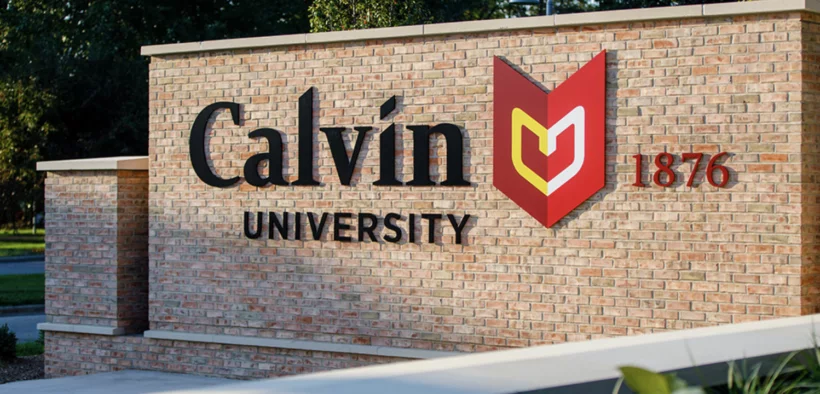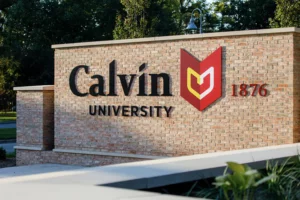Calvin University Board Tasked With Examining Faculty Dissent
Some faculty disagree with denomination’s stance on LGBTQ issues

(RNS) — The denomination overseeing Calvin University has asked the Grand Rapids, Michigan, school to develop a process for dealing with faculty members who disagree with parts of church doctrine.

Calvin University in Grand Rapids, Michigan. (Photo by Andy Calvert, courtesy of Calvin University)
The charge, part of the June 18 annual synod of the Christian Reformed Church in North America, was described as an effort to “rebuild trust” between the denomination and its flagship school. In particular, the synod was concerned with faculty members who oppose the denomination’s 2022 decision to codify in its confession of faith “homosexual sex” as sinful.
Delegates to this month’s synod also voted to instruct churches that are LGBTQ+-approving to repent of their stance or disaffiliate with the denomination and placed church officers who are LGBTQ+-approving on “limited suspension.”
While the synodical report recognized “Calvin’s efforts to be faithful to the Reformed confessions in the context of academic inquiry,” some members of the university faculty raised concerns about the decisions’ implications for academic freedom.
The decisions at the 2024 synod involved major changes to church policy on confessional difficulty, sometimes also called a “gravamen.” A gravamen is an official statement that church members and other officebearers may file to register disagreement with a specific part of church doctrine.
Calvin faculty are not considered church officebearers, but Calvin is one of the denominational institutions instructed to “review and revise, as needed, their gravamina policies.”
A number of Calvin faculty have submitted gravamina related to the denomination’s stance on human sexuality. The exact number is hard to ascertain since these statements of confessional difficulty are confidential. But following the synod’s 2022 decision codifying the view of LGBTQ+ sex as sinful, about a dozen faculty came together as a cohort to file formal disagreements, or gravamina.
Access to MinistryWatch content is free. However, we hope you will support our work with your prayers and financial gifts. To make a donation, click here.
As a denominationally affiliated school, Calvin faculty are required to sign a covenant affirming the Heidelberg Catechism. They are also required to pledge to “teach, speak, and write in harmony with the confessions,” according to the faculty handbook.
David Koetje, a professor of biology and vice-chair of the faculty senate, said the administration was “still trying to figure out what this means for Calvin faculty who’ve acted in good faith within Calvin’s longstanding gravamina process.”
James Bratt, a retired history professor, noted that the synod’s request isn’t new. Throughout the 1940s, faculty were required to submit their course outlines to the synod for review. In the ‘80s and ‘90s, Calvin physics professor Howard Van Til was subject to scrutiny by the denomination related to his scholarship on the Earth’s age and the publication of his controversial book, “The Fourth Day,” which opposed creationism. During the early 2010s, the synod questioned several Calvin religion professors over how they taught creation and evolution.
Some Calvin faculty are nervous about the implications of the synod’s decisions for the future. University administrators held a town hall meeting for faculty earlier this week.
“I came away trusting that the university leadership and the board of trustees want to continue to carve out a place and a way for Calvin University to be the kind of institution it’s always been,” said Jamie Smith, professor of philosophy at Calvin, after the meeting.
The synod instructed Calvin’s board to bring a progress report on the confessional-difficulty gravamen process to next year’s denominational meeting.
“We don’t expect any immediate impact on faculty or students in 2024-2025,” Provost Noah Toly said. “I’m encouraged that there’s a path forward in which we build on the policies and procedures we already have in place.”
The authority to decide next steps for the university rests with the 31-member board of trustees, which was charged to present a progress report to next year’s synod. Some board members are chosen directly by the synod, and all board members must be approved by the synod.
(A version of this story appeared in the Calvin University Chimes on June 26, 2024.)
TO OUR READERS: Do you have a story idea, or do you want to give us feedback about this or any other story? Please email us: [email protected]



